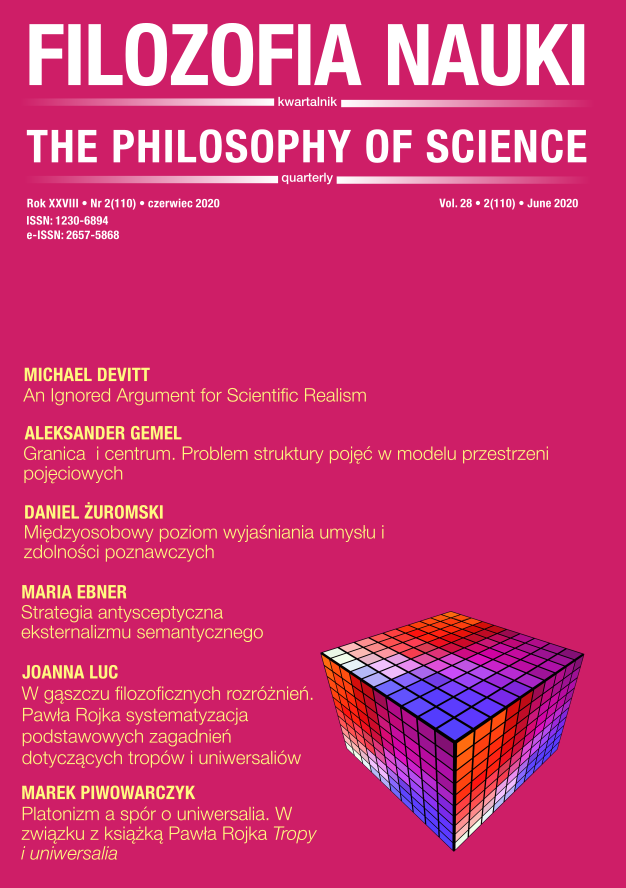Semantic Externalism and Its Answer to the Problem of Skepticism
DOI:
https://doi.org/10.14394/filnau.2020.0010Keywords:
anti-skeptical arguments, semantic externalism, privileged self-knowledge, disjunctive argument, reductio argument, slow switching arguments, transcendental argumentsAbstract
This paper discusses various answers to the problem of skepticism offered by some advocates of semantic externalism: Putnam’s argument against the brain-in-a-vat hypothesis and its reconstructions presented by Brueckner and Warfield. I argue that all these responses fall short of being successful. Brueckner’s disjunctive argument needs to be supplemented by a disquotational principle that assumes a specific interpretation of the other premises (the vat-English interpretation is excluded). Warfield’s argument rests on the principle of privileged access to the content of one’s own mental states. This additional premise is highly controversial given the externalist theory of meaning. I discuss two kinds of argument against combining semantic externalism with privileged self-knowledge: the reductio argument and the “slow-switching” arguments. The last part of the paper critically examines McKinsey’s attempt to construct a successful anti-skeptical argument.
References
Boghossian P. (1998), What the Externalist Can Know “A Priori”, „Philosophical Issues” 9, 197-211. https://doi.org/10.2307/1522971
Brueckner A. (1986), Brains in a Vat, „The Journal of Philosophy” 83(3), 148-167. https://doi.org/10.2307/2026572
Burge T. (1988), Individualism and Self-Knowledge, „The Journal of Philosophy” 85(11), 649-663. https://doi.org/10.5840/jphil1988851112
Chalmers D. (2015), Matriks jako metafizyka, „Roczniki Filozoficzne” 63(4), 187-229. https://doi.org/10.18290/rf.2015.63.4-7
DeRose K. (1995), Solving the Skeptical Problem, „The Philosophical Review” 104(1), 1-52. https://doi.org/10.2307/2186011
Dretske F. (1999), Epistemic Operators [w:] Skepticism. A Contemporary Reader, K. DeRose, T. A. Warfield (eds.), Oxford–New York: Oxford University Press, 131-144.
Kartezjusz (2001), Medytacje o pierwszej filozofii, tłum. M. Ajdukiewicz, K. Ajdukiewicz, S. Swieżawski, I. Dąmbska, Kęty: Antyk.
Lewis D. (1999), Elusive Knowledge [w:] Skepticism. A Contemporary Reader, K. DeRose, T. A. Warfield (eds.), Oxford–New York: Oxford University Press, 220-239.
Ludlow P. (1995a), Externalism, Self-Knowledge, and the Prevalence of Slow Switching, „Analysis” 55(1), 45-49. https://doi.org/10.1093/analys/55.1.45
Ludlow P. (1995b), Social Externalism, Self-Knowledge, and Memory, „Analysis” 55(3), 157-159. https://doi.org/10.1093/analys/55.3.157
McKinsey M. (2002), Forms of Externalism and Privileged Access, „Philosophical Perspectives” 16, 199-224. https://doi.org/10.1111/1468-0068.36.s16.8
McKinsey M. (2018), Skepticism and Content Externalism [w:] The Stanford Encyclopedia of Philosophy (Summer 2018 Edition), E. N. Zalta (ed.). https://stanford.io/2Y12fbP
Nozick R. (1999), Philosophical Explanations [w]: Skepticism. A Contemporary Reader, K. DeRose, T. A. Warfield (eds.), Oxford–New York: Oxford University Press, 156-179.
Putnam H. (1998a), Mózgi w naczyniu [w:] Wiele twarzy realizmu i inne eseje, tłum. A. Grobler, Warszawa: Wydawnictwo Naukowe PWN, 295-324.
Putnam H. (1998b), Znaczenie wyrazu „znaczenie” [w:] Wiele twarzy realizmu i inne eseje, tłum. A. Grobler, Warszawa: Wydawnictwo Naukowe PWN, 93-184.
Rysiew P. (2016), Epistemic Contextualism [w:] The Stanford Encyclopedia of Philosophy (Winter 2016 Edition), E. N. Zalta (ed.). https://stanford.io/3e0fbEb
Stern R. (2011), Transcendental Arguments [w:] The Stanford Encyclopedia of Philosophy (Summer 2019 Edition), E. N. Zalta (ed.). https://stanford.io/ 2XU1cKt
Strawson P. F. (1959), Individuals. An Essay in Descriptive Metaphysics, London: Methuen.
Stroud B. (1968), Transcendental Arguments, „Journal of Philosophy” 65(9), 241-256. https://doi.org/10.2307/2024395
Warfield T. A. (1992), Privileged Self-Knowledge and Externalism Are Compatible, „Analysis” 52(4), 232-237. https://doi.org/10.1093/analys/52.4.232
Warfield T. A. (1999), A Priori Knowledge of the World. Knowing the World by Knowing Our Minds [w]: Skepticism. A Contemporary Reader, K. DeRose, T. A. Warfield (eds.), Oxford–New York: Oxford University Press, 76-90.



















 Filozofia Nauki/The Philosophy of Science | ISSN 1230-6894 | e-ISSN 2657-5868
Filozofia Nauki/The Philosophy of Science | ISSN 1230-6894 | e-ISSN 2657-5868